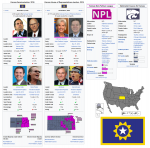- Location
- Op een dag, Nederland.
- Pronouns
- she/her & ne/nem
Something experimental
Westminster Palace
10 December 2015
President of the Senate Roy Hattersley was tired. He saw too much. He saw Presidents come and go, some even dying. This year hit him hard as Sedgemore and then Meacher's deaths meant that he was now the only one alive who had presidential experience as three-time Acting President. Two too many. He remembered the eager to serve person he was back in 1998. A completely different person. One who even dreamed of being a proper President himself. Now? He wouldn't take the job even if Parliament voted unanimously to demand him to assume the office. It was somewhat cursed, that he was sure of.
Scratching his beard, he thought over the words, words he uttered to Presidents four times before. "Sir, is your Excellency willing to take the Oath?" started it off. He remembered that he came up with the words himself as his prime contribution to the whole new republican decorum, something that President Meacher moaned to him a decade later as "royalism wrapped in republicanism". He missed Michael very much.
He did not know why he was still President of the Senate. Perhaps he just wanted to hit the big twenty? Perhaps he felt a sense of responsibility to hold on as long as possible so to ensure that every President would have his capable advice? Maybe it was just sheer egoism still present in his aging and exhausted body, the idea that no one else could be President of the Senate better than him?
His inauguration garb was simple, a white cloak with a hood. He had no idea why it was even used, he didn't come up with it, it was something someone with a Welsh accent, he thought, put in as an idea late at night and that the tired convention waved through. Nevertheless, it was now tradition and he pulled the hood up. He looked like a grim old wizard came to deliver the bad news. Perhaps that was what he was.
Approaching the new President on the old throne, who was smiling politely at everyone - Jeremy Corbyn was a natural smiler - he felt like a cold wind in a warm room that made everyone shiver. When Corbyn's face turned to him, he could see the face go serious and his body posture get ready for the death sentence - no, inauguration oath. There was still a difference.
He lapsed back into his habitual, well-practised, routine - "Sir, is your Excellency willing to take the oath?"
"I am willing" declared President Corbyn. Every single one of them declared such. The oath was continued and confirmed, before Corbyn kneeled before... God? The people? Past heads of state? Who knows.
“The things which I have here before promised, I will perform and keep." said President Corbyn. Meanwhile President of the Senate Hattersley muttered "God help you, your Excellency" under his breath.
And so another man was condemned.
Westminster Palace
10 December 2015
President of the Senate Roy Hattersley was tired. He saw too much. He saw Presidents come and go, some even dying. This year hit him hard as Sedgemore and then Meacher's deaths meant that he was now the only one alive who had presidential experience as three-time Acting President. Two too many. He remembered the eager to serve person he was back in 1998. A completely different person. One who even dreamed of being a proper President himself. Now? He wouldn't take the job even if Parliament voted unanimously to demand him to assume the office. It was somewhat cursed, that he was sure of.
Scratching his beard, he thought over the words, words he uttered to Presidents four times before. "Sir, is your Excellency willing to take the Oath?" started it off. He remembered that he came up with the words himself as his prime contribution to the whole new republican decorum, something that President Meacher moaned to him a decade later as "royalism wrapped in republicanism". He missed Michael very much.
He did not know why he was still President of the Senate. Perhaps he just wanted to hit the big twenty? Perhaps he felt a sense of responsibility to hold on as long as possible so to ensure that every President would have his capable advice? Maybe it was just sheer egoism still present in his aging and exhausted body, the idea that no one else could be President of the Senate better than him?
His inauguration garb was simple, a white cloak with a hood. He had no idea why it was even used, he didn't come up with it, it was something someone with a Welsh accent, he thought, put in as an idea late at night and that the tired convention waved through. Nevertheless, it was now tradition and he pulled the hood up. He looked like a grim old wizard came to deliver the bad news. Perhaps that was what he was.
Approaching the new President on the old throne, who was smiling politely at everyone - Jeremy Corbyn was a natural smiler - he felt like a cold wind in a warm room that made everyone shiver. When Corbyn's face turned to him, he could see the face go serious and his body posture get ready for the death sentence - no, inauguration oath. There was still a difference.
He lapsed back into his habitual, well-practised, routine - "Sir, is your Excellency willing to take the oath?"
"I am willing" declared President Corbyn. Every single one of them declared such. The oath was continued and confirmed, before Corbyn kneeled before... God? The people? Past heads of state? Who knows.
“The things which I have here before promised, I will perform and keep." said President Corbyn. Meanwhile President of the Senate Hattersley muttered "God help you, your Excellency" under his breath.
And so another man was condemned.
Last edited:






